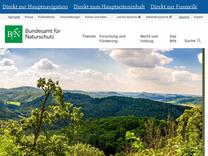BfN-Schriften 672 – Riverine and Coastal Wetlands for Biodiversity and Climate – Linking Science, Policy and Practice. A Compilation of Abstracts for the 5th European Conference 26-28 September 2023 in Bonn, Germany | BFN https://www.bfn.de/publikationen/bfn-schriften/bfn-schriften-672-riverine-and-coastal-wetlands-biodiversity-and
(BfN) and the European Net-work of Heads of Nature Conservation Agencies (ENCA) have
(BfN) and the European Net-work of Heads of Nature Conservation Agencies (ENCA) have

